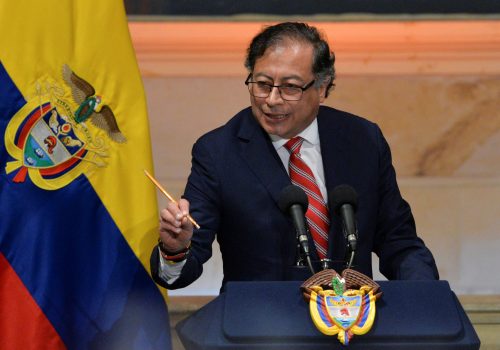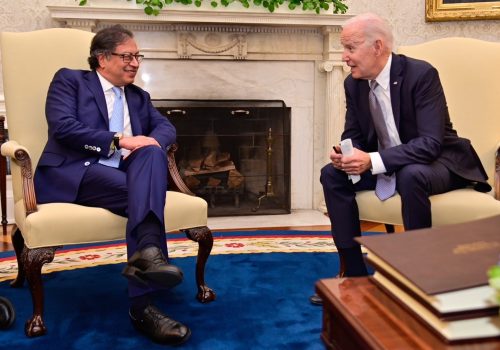Advancing US-Colombia cooperation on drug policy and law enforcement
A report by the Atlantic Council’s US-Colombia Advisory Group; honorary co-chaired by Senator Ben Cardin (D-MD) and Senator Bill Hagerty (R-TN)
With Geoff Ramsey and Isabel Chiriboga
Executive summary
On September 7, 2023, the Petro administration presented a new strategy to combat the illicit drug trade in Colombia—at a time when illicit coca cultivation is at an all-time high. The strategy’s emphasis on rural development and on offering viable economic alternatives for illicit crop growers, as well as changing counternarcotics priorities in Washington, provide a set of new opportunities for US-Colombia collaboration.
The United States and Colombia have a thirty-year track record of collaboration on this issue. Yet there is still a long road ahead, especially considering the growing concerns over the proliferation of organized crime in Colombia and the region writ large. In this context, progress on US-Colombia counternarcotics cooperation will require a delicate balance between reducing large-scale coca cultivation and building the capacity of security services to disrupt organized criminal networks, as well as investing in the rural communities most affected by this phenomenon.
At the same time, there is a growing recognition in the United States that the illicit drug trade is a shared responsibility primarily fueled by demand. Consumption and price have remained stable in the United States in recent years. However, the current trend of falling coca leaf and cocaine prices in Colombia present a natural incentive for coca growers to find alternative forms of income, which could mean a higher rate of success for alternative development programs and crop-substitution efforts if combined with a comprehensive law enforcement strategy.
The United States and Colombia should continue to collaborate closely to address the problems arising from the supply and demand for illicit drugs in this global context. This is crucial considering the emergence of new drug markets in West Africa and Europe, as well as the connections of certain trafficking organizations to fentanyl production. These dynamics, as well as a lack of state presence and the absence of economic alternatives in many parts of rural Colombia, have created longstanding challenges for both countries. Moving forward, it is crucial that both nations align their strategies to make the most impactful use of US assistance. The recommendations presented here are meant to bolster the approach to a decades-old problem.
US-Colombia Advisory Group recommendations
1. Enhance international cooperation efforts to dismantle organized crime groups and bolster interdiction operations.
Under Colombian law, any individual arrested by a Colombian authority at sea must be presented to a judicial officer within forty-eight hours. In practice, this means that offshore patrol vessels (OPVs) must leave their station. During that time, there is a gap in maritime coverage. The United States can support Colombia by offering essential equipment and training to incorporate advanced technology into OPVs. This could involve leveraging video processing techniques to facilitate due process during apprehensions at sea, thus negating the need for the vessel to return to port, while ensuring the protection of the rights of the accused and full compliance with Colombian law.
2. Define precise and inclusive guidelines for the manual eradication of “industrial” plantations, while working to develop additional metrics to measure progress.
In replacing coca and other illicit crops with other industrial-scale agricultural yields, several factors should be considered. These include the type of industrial crops best suited for coca-growing areas, the presence of an external market for large-scale production, and the fulfilment of sanitary and phytosanitary (SPS) standards overseas so that these products can have a guaranteed market access. To comply with these requirements, the Colombian government should promote public and private alliances to produce industrial-scale crops with SPS standards approved.
3. Strengthen coordination efforts between national and local governance on rule of law and state presence in conflict-torn communities.
The Petro administration should enhance coordination efforts between the national government and local authorities. While the current drug and security strategies outline fundamental areas for progress, they can better incorporate perspectives from local government at the level of cities and municipalities. These include persistent budgetary concerns exacerbated by growing migration pressures and the need for greater coordination on the implementation of nationwide policies.
4. Expand and strengthen US-led capacity-building programs for the prevention and detection of money laundering and financial crimes, with a focused emphasis on cyber-based illicit transactions.
Certain sectors, including banking, gold mining, legal advisory, and real estate are particularly vulnerable to money laundering. To address this, Colombian law enforcement, military forces, and intelligence units should enhance existing partnerships with their US counterparts to significantly upscale training and capacity-building with an emphasis on cyber-based illicit transactions. Special attention should be given to small financial cooperatives and credit providers, which are at a higher risk of unwittingly facilitating illegal transactions.
5. Advance the implementation of a holistic bilateral counternarcotic agenda through a careful balance of effective drug policies.
The United States and Colombia should prioritize policies that will mitigate the escalating violence and security challenges Colombia faces. This includes enhanced cooperation efforts on real-time intelligence sharing on drug trafficking including routes, money laundering, and key individuals, and promoting advanced technologies for surveillance, interdiction, and data analytics to combat traffickers. Once the security situation is under control cooperation should focus on making those conditions sustainable through long-term social programs.
6. Work with affected communities to develop an environmentally sustainable approach to transition to legal crop cultivation while mitigating further environmental damage.
The United States could be a key partner in accompanying the Colombian government in shaping the preservation of the Amazon, as it will require restructuring a portion of Colombia’s debt to allocate the saved funds toward initiatives focused on forest preservation, sustainable land use, and community development. To achieve this, both countries can begin by collaborating on a detailed framework that outlines specific conservation targets and reforestation goals to then decide on the allocation of saved debt funds toward a combination of projects, particularly in areas with coca cultivation.
7. Advocate for the creation of a multilateral trust fund that can provide sustained funding for crop substitution and alternative development programs to curb the growing illicit drug-production trend.
Colombia’s new anti-drug strategy carries an estimated cost exceeding $21 billion over the next decade. To secure international support and incentivize donors to contribute to the long-term success of crop substitution and an alternative development program, we propose the establishment of a trust fund led by a recognized international financial institution. Given that the World Bank has a proven track record of efficiently mobilizing resources through trust funds,1“Trust Funds and Programs,” World Bank, accessed August 2023, 2023, https://www.worldbank.org/en/programs/trust-funds-and-programs#:~:text=Trust%20funds%20allow%20the%20Bank,development%20actors%20through%20partnership%20programs. it may be best suited to leverage its extensive convening power on both the international stage and within individual countries.
About the US-Colombia Advisory Group
Since its founding in 2017, the Advisory Group has been co-chaired by Senators Roy Blunt (R-MO) and Ben Cardin (D-MD). This year, upon Senator Blunt’s retirement, Senator Bill Hagerty (R-TN) assumes the honorary chairmanship alongside Senator Cardin.
Senators Cardin and Hagerty are both members of the Senate Foreign Relations Committee, where, in addition to other assignments, Senator Cardin serves as Chairman and Senator Hagerty as Ranking Member of the Subcommittee on State Department & USAID Management, International Operations, & Bilateral International Development. The two senators bring additional regional and global expertise to their honorary co-chairmanship: Senator Cardin is a member of the Subcommittee on Western Hemisphere, Transnational Crime, Civilian Security, Democracy, Human Rights, & Global Women’s Issues; and Senator Hagerty is a member of the Subcommittee on East Asia, The Pacific, & International Cybersecurity Policy.
In 2023-2024, the Advisory Group will provide a concrete plan on how to navigate the potential changes in US-Colombia relations. A new administration in Colombia represents a unique opportunity to work with an increasingly diverse set of actors in the public, private, and civil society sectors to deepen US-Colombia economic and diplomatic ties. The Advisory Group will advance concrete recommendations where the United States and Colombia can advance long-lasting peace and socio-economic prosperity that mutually benefits each country.
About the writers
Geoff Ramsey is a senior fellow at the Atlantic Council’s Adrienne Arsht Latin America Center. Ramsey is a leading expert on US policy towards Venezuela and has traveled regularly to the country for the last decade. Before joining the Atlantic Council, Ramsey directed the Venezuela program at the Washington Office on Latin America where he led the organization’s research on Venezuela and worked to promote lasting political agreements aimed at restoring human rights, democratic institutions, and the rule of law. Prior to that, he carried out research and reporting on security and human-rights issues in Colombia, Uruguay, and Brazil with InSight Crime and as a consultant for the Open Society Foundations. His work has been published or cited in Foreign Policy, the New York Times, the Wall Street Journal, the Washington Post, the Economist, and other major media outlets. Ramsey earned a master’s degree in international affairs from the American University School of International Service, as well as a bachelor of arts in international studies with a minor in Spanish from American University.
Isabel Chiriboga is a program assistant at the Atlantic Council’s Adrienne Arsht Latin America Center, where she contributes to the center’s work on Colombia, Ecuador, Peru and Chile. She also helps steward the Center’s Advisory Council. During her time at the Atlantic Council, she has supported the work of the US-Colombia Advisory Group, the US-Chile Integration Program and the center’s programming around the International Monetary Fund and World Bank meetings. Her work has been published in Foreign Policy, Miami Herald, The National Interest, Global Americans and the New Atlanticist. Prior to her time at the Atlantic Council, Chiriboga worked as a research assistant at the London School of Economics’ Department of International Relations conducting research on the impact of land inequality in Argentina’s democratization. Prior to that, she worked at the embassy of Ecuador in Washington, where she supported the trade agreement negotiations process between Ecuador and the United States. Originally from Ecuador, Chiriboga has lived in the United States, Spain, and the United Kingdom. She has a bachelor’s degree in international economics and international affairs from Trinity University. Chiriboga also completed a year-long study abroad program at the London School of Economics.
About the Center Director
Jason Marczak is the Vice President and Senior Director of the Atlantic Council’s Adrienne Arsht Latin America Center, joining the center in 2013 for its launch. He has more than twenty years of expertise in regional economics, politics, and development, working with policymakers and private-sector leaders to shape public policy. Marczak has also been an adjunct professor at the George Washington University’s Elliott School of International Affairs since 2016. Among his previous positions, he served as director of policy at Americas Society/Council of the Americas in New York City and co-founder of Americas Quarterly magazine. Marczak is a frequent English- and Spanish-language contributor to major media outlets, and a sought-after speaker, and has testified before the US Congress on key regional developments. He holds a bachelor’s degree from Tufts University and a master’s degree in international affairs and economics from the Johns Hopkins University Paul Nitze School of Advanced International Studies.
US-Colombia Advisory Group
We are beyond grateful to our US-Colombia Advisory Group members for their passion, commitment, expertise, and leadership. Members who provided crucial input and have decided to have their names associated with this report are listed below.
Honorary Co-Chairs
The Hon. Ben Cardin
US Senator (D-MD)
United States
The Hon. Bill Hagerty
US Senator (R-TN)
United States
Members
Alejandro Mesa
Ambassador Anne Patterson
Ambassador Carolina Barco
Ambassador Kevin Whitaker
Ambassador P. Michael McKinley
Ambassador Paula Dobriansky
Ambassador Rand Beers
Ambassador Roger Noriega
Ambassador William Brownfield
Angela Tafur
Cynthia Arnson
Felipe Ardila
Josefina Klinger
Juan Esteban Orduz
Kristie Pellecchia
Minister Maria Claudia Lacouture
Minister Mabel Torres
Minister Mauricio Cardenas
Michael Shifter
Muni Jensen
Stephen Donehoo
Steve Hege
Acknowledgments
We would like to thank Adrienne Arsht for her generous support, without which the work of this Advisory Group would not have been possible.
Foremost, thank you to Senator Bill Hagerty (R-TN) and Senator Ben Cardin (D-MD) for their leadership as honorary co-chairs of this group. It is always a true pleasure and honor to work with them and to see how successful bipartisan efforts come to fruition. Thank you to Robert Zarate, Nick Checker, Lucas Da Pieve, Michael Manucy, Tom Melia, Brandon Yoder, Stephanie Oviedo, and Aidan Maese-Czeropski for facilitating the unwavering cooperation of our honorary co-chairs.
Isabel Chiriboga, Adrienne Arsht Latin America Center (AALAC) program assistant, was an instrumental force behind this project from start to finish. She played a key role in coordinating the Advisory Group, drafting the report, and organizing multiple strategy sessions. We also thank Enrique Millán-Mejía, AALAC consultant, who provided crucial expertise, important feedback, and logistical support for this project, and Lucie Kneip for her research and editorial support throughout the publication process. The success of this project is also thanks to the leadership of Jason Marczak and Geoff Ramsey, who worked to convene the Advisory Group and whose passion for a prosperous US-Colombia strategic partnership is reflected in this brief.
For decisive input, thorough research, and as an exceptional adviser on the topic we thank Ambassador Kevin Whitaker. For their precise editorial assistance and flexibility, we thank Cate Hansberry and Mary Kate Aylward and Beverly Larson. We would also like to extend our thanks to Nancy Messieh, Andrea Ratiu, and Romain Warnault for their design of another Adrienne Arsht Latin America Center publication.

The Adrienne Arsht Latin America Center broadens understanding of regional transformations and delivers constructive, results-oriented solutions to inform how the public and private sectors can advance hemispheric prosperity.
Related content
Image: A drug-sniffing dog sniffs barrels that authorities say contain cocaine dissolved in chemical fertilizers and honey, in Cartagena, Colombia February 4, 2022. Picture taken February 4, 2022. To match Insight COLOMBIA-DRUGS/MEXICO-COCA REUTERS/Luis Jaime Acosta


